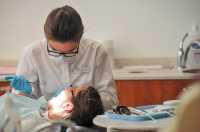Author Interviews, Dental Research / 02.06.2019
Majority of Antibiotics Prescribed Before Dental Procedures Are Unnecessary
MedicalResearch.com Interview with:
Dr. Katie Suda, PharmD, M.S.
Associate Professor
College of Pharmacy
University of Illinois at Chicago
MedicalResearch.com: What is the background for this study?
Response: Dentists prescribe approximately 1 in every 10 antibiotics in the United States and are the top specialty prescriber. Dentists are the primary prescriber of clindamycin in the U.S., which is associated with a high risk of C. difficile infection (an overgrowth of bacteria in the GI tract that can cause a life-threatening infection). Clinical guidelines recommend that patients with specific cardiac conditions receive a dose of antibiotics prior to undergoing invasive dental procedures to prevent infective endocarditis (an infection of the heart values). Taking a dose of antibiotics prior to a dental visit is referred to as antibiotic prophylaxis. Starting in 2007, these guidelines were narrowed secondary to poor evidence on the effectiveness of antibiotic prophylaxis and the risk of antibiotic-related adverse events. Antibiotic adverse events include antibiotic resistance, C. difficile infection, and other general adverse events (nausea, vomiting, diarrhea).
While significant research has been conducted on unnecessary prescribing of antibiotics by medical providers, little work has described appropriateness of prescribing by dentists. We assessed if antibiotics prescribed for prophylaxis prior to dental procedures were consistent with clinical guidelines.
(more…)


